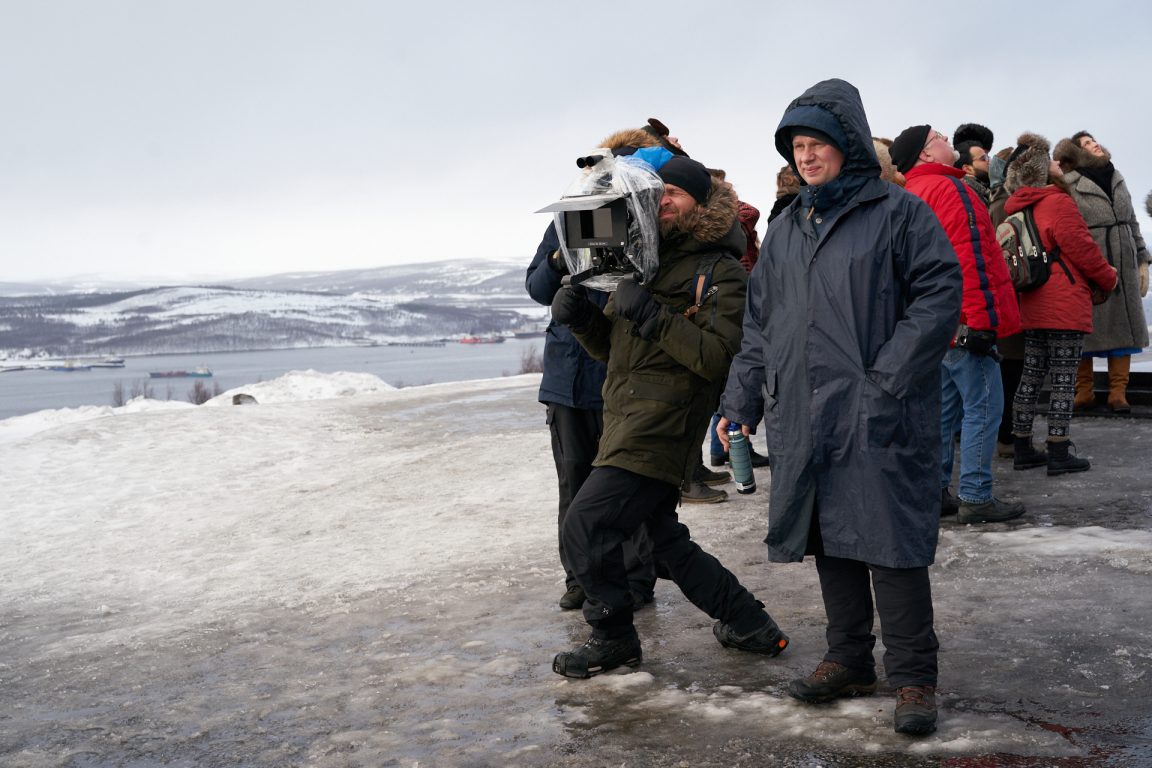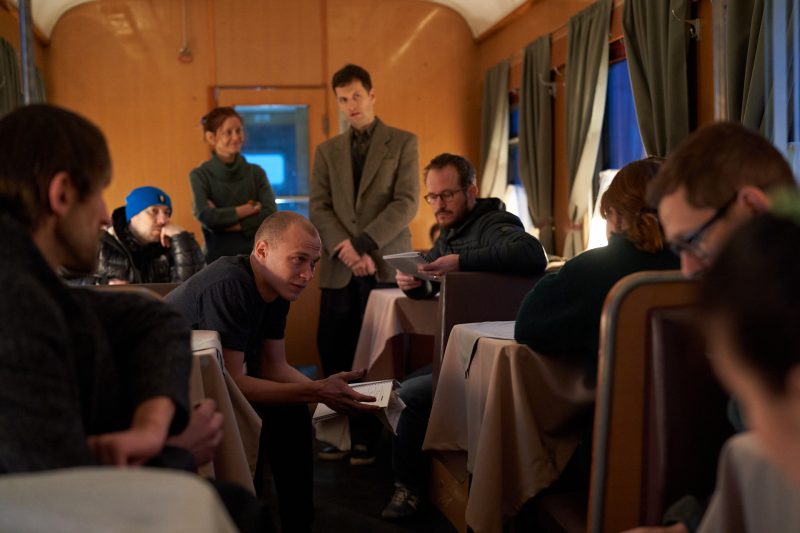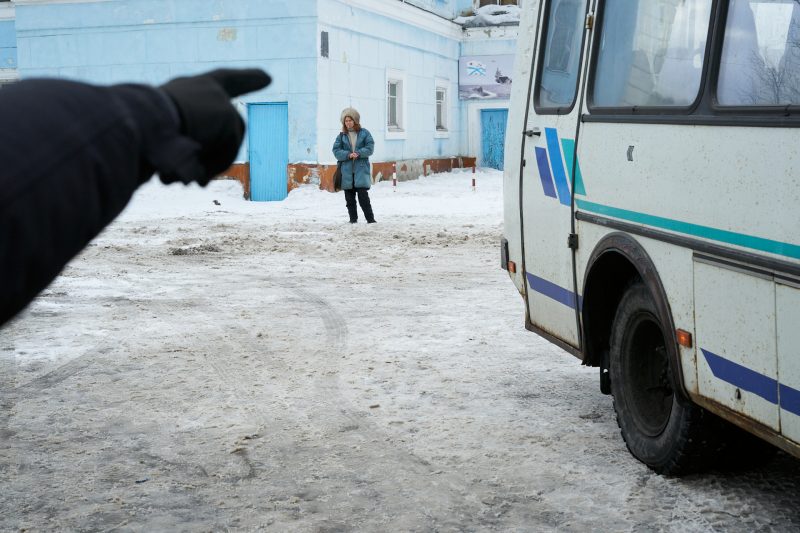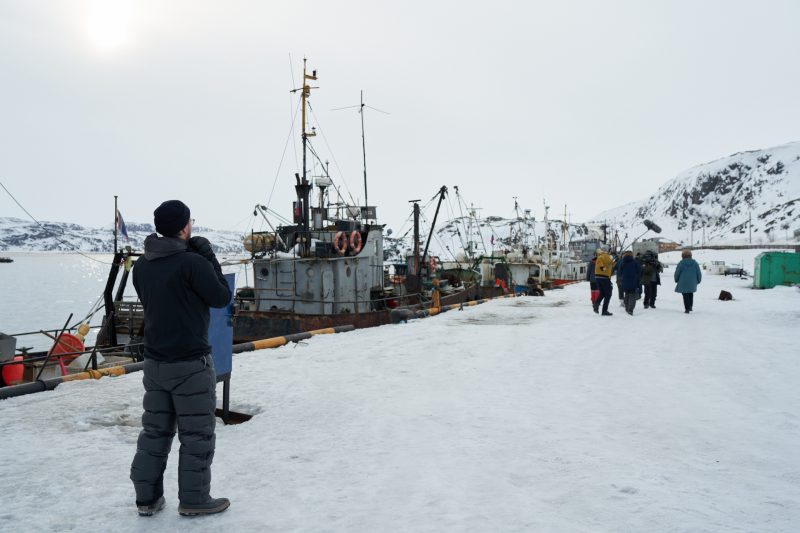International Outlooks: Eyes on Russia – How Russian film industry overcomes the consequences of the coronavirus crisis

How has Russian film industry been affected by the pandemic? What to expect from co-producing with Russia in the future? In our article series International Outlooks, film industry professionals tell us what we should know about international distribution of films now that the business is in turmoil. In this fifth article, Aleksandr Nechaev, editor-in-chief of Booker’s Bulletin (Russia), focuses on Russia.
Written by Aleksandr Nechaev
Images: Making of Compartment No 6, by Sami Kuokkanen / Aamu Film Company
In 2020, the box office of all films released in Russia amounted to 22.8 billion Rubles ($347 million) and was 59% less than in 2019. The number of tickets sold was 88 million. The average ticket price for the year increased by 2.2% and amounted to 260 Rubles ($3.9).
However, Russian film distribution market has been affected less by the COVID-19 pandemic than markets in Europe and America due to the Russian authorities’ denial to introduce a second lockdown in fall 2020. Theatres in most regions of Russia got closed at the end of March 2020 until the very beginning of August, after which they re-opened with a capacity limit of 15 to 50%. Thanks to this, Russia was in the 7th place in the world in terms of the box office revenue, rising from the 9th place it occupied in 2019.
So let us bring you up to date on how the pandemic affected the preferences of the audience in the country as well as the film production process, especially joint projects with international companies.
The theatres’ share of foreign movies in Russia decreased to 53% by the end of 2020, while in 2019 it reached 78%: 339 titles were released (as opposed to 480 releases in the previous year). In such context, the domestic film sector achieved an absolute record – its share was 47%. Last year, the box office revenue total share of Russian films reached only 22%. 98 Russian projects were released, in 2019 there were 172 of them. Since the revenue drop of Russian films compared to 2019 was only 12.6% it could be concluded Russian titles did work more successfully and efficiently than, on average, they usually do.
The highest-grossing film of the year was the Russian musical melodrama Ice 2 ($23.3 million), the 2nd place was taken by Guy Ritchie’s comedy thriller Gentlemen ($19.4 million), the 3rd place went to the Russian science fiction Invasion ($15.6 million). All of these films happened to be released before the lockdown. The most successful one of 2020, which came out right after the lockdown was Tenet ($12.7 million).
Russian fall 2020 recorded half-empty cinema halls, still the New Year holidays – the period of national weekends from January 1st to 10th, usually scoring up to about 10% of the annual box office – led many analysts to reconsider their pessimistic forecasts: the total holidays’ revenue amounted to about $45 million. 11 million viewers came to theatres during the first 10 days of January 2021 (against 15 million in 2020).
Due to the lack of Hollywood releases, local movies began to play a crucial role in Russian film distribution recovery process. The same trends prevailed in Russia and in all growing markets as a whole – post-quarantine distribution results in the world indicated that territories with strong local content reach their pre-crisis level much faster than others.
The pandemic did cause damage to Russian film production as the shooting of dozens of films in spring/summer 2020 got postponed. The production resumed in mid-July under new safety measures. And by the end of 2020, the number of projects under production (more than 100) has reached the pre-COVID era indicators.
Art-mainstream and co-productions
In January 2021, ScreenDaily drew up a list of 50 European films of potential interest to program directors of film festivals for the current year. It included five Russian films: Gerda, No Looking Back, Compartment No 6, Convenience Store, and Petrov’s Flu. The last three projects are being co-produced with other countries.

Making of Compartment No 6, photo by Sami Kuokkanen / Aamu Film Company
Compartment No 6 by Finnish director Juho Kuosmanen, who won the main prize in Un Certain Regard section at Cannes Film Festival in 2016 for his debut The Happiest Day in the Life of Olli Mäki, tells about the railway romance of a Finnish student and a Russian miner in the 1990s. Four countries took part in this film production: Russia (represented by producers Sergey Selyanov and Natalia Drozd), Finland, Estonia, and Germany while filming process took place in Russia and ended on the eve of the pandemic.
According to Natalia Drozd, an outstanding international team was formed for this project. “Despite the fact that the director and the main crew of the project are from Finland, the film is set entirely in Russia and the language of the film is Russian. The main reference for me is Lost in Translation (2003) – the story of the gradual rapprochement of two completely different human beings, a story full of tenderness and comedy”, Drozd comments.
The psychological drama of a magical realism style Gerda by Natalia Kudryashova, who was awarded in 2018 for best female performance of Venice Film Festival’s Orizzonti section with her film The Man Who Surprised Everyone, will tell a story of a student seeing her soul in dreams, and then in reality.
No Looking Back and Convenience Store are produced by Artem Vasiliev’s company Metrafilms, which actively works with foreign partners. Kirill Sokolov, whose black comedy Why Don’t You Just Die has been praised at 40 festivals and warmly welcomed by the audience around the world, is named the director of the comedy No Looking Back. In the center of this young director’s new film plot will be three women from different generations of the same family, fighting with each other.
The social drama Convenience Store by Mikhail Borodin tells about the modern slavery of illegal migrants from Central Asia in Moscow. The film is being created together with co-producers from Slovenia and Turkey with the support of the Russian Ministry of Culture, the Russian private foundation Kinoprime (whose owner is the Russian magnate Roman Abramovich) and the Eurimages foundation. “Based on various project markets’ feedback we received, the film’s issues, which are relevant for Russia, accurately get straight to the international social life’s point. The project has already attracted the interest of the world’s leading film festivals and sales companies,” Artem Vasiliev says.
During the pandemic, Vasiliev had been waiting for the filming to resume for a large-scale military pilot drama Air together with director Aleksey German Jr. (Dovlatov). At the same time, they quickly found foreign partners and shot the drama House Arrest. The rational budgeting, private investments, and the name of the director played a role in the prompt and successful financing, as German is a brand name in European cinematic circles. The film was co-produced by the Canadian Outrageous Film Company and the German LM Media.
“This project seemed to us perfect to implement in the conditions of the pandemic,” the film’s producer Artem Vasiliev comments. “The production process is technically ‘sealed’, there are only a few locations used, a small film crew is needed. This is an international project in terms of the cast and crew; the film already has a well-known international sales company, which will be announced later.”
Metrafilms also plans to shoot the film Aspiration by Mikhail Idov in 2021. It is a co-production of three countries: Russia, Canada and France. The team is waiting for Canada to open; casting in North America is ongoing right now.

Making of Compartment No 6, photo by Sami Kuokkanen / Aamu Film Company
The last title on the ScreenDaily list, fantastic drama Petrov’s Flu by Kirill Serebrennikov, director of Leto and The Student, tells the story of a family who fell ill with the flu. This is an adaptation of the Russian book bestseller of 2016, mainly inspired by James Joyce’s Ulysses. The production, supported by Kinoprime Foundation and Arte Cinema France, involved the Russian Hype Film, the French Logical Pictures and Charades Production, the German Razor Film and the Swiss Bord Cadre Films.
Hype Film is another Russian company, along with Metrafilms, involving a strategy of inexpensive art mainstream film production with foreign producers’ support. One of the company’s main releases of 2020 was the drama Persian Lessons, which collected more than $300,000 dollars in Germany. Hype Film is currently working on The Execution, a thriller about the Russian province serial murder investigation, which managed to attract partners in France and the United States (Pulsar Content and XYZ Films).
The Owner, a drama by Yuri Bykov (the director of The Factory), is now at the development stage, supported by France, Switzerland, the UK and Mexico. Meanwhile, Hype Film is planning on shooting another international project in 2021, the directorial debut of Jonathan Littell, the author of the novel The Kindly Ones. The script will be co-produced by French and German companies, and filmed in Russian. Also, Kirill Serebrennikov’s a new adaptation Mengele based on the novel The Disappearance of Joseph Mengele by the French writer Olivier Guez will be created with foreign partners.
“We managed to finish almost all the films that we had in production during the Pandemic, although it was not an easy task due to the restrictions and security measures,” Ilya Stewart, Hype Film producer, says. “All our partners were just relieved, because in many countries, especially in the United States, it’s simply impossible to shoot during the pandemic. First of all, due to the fact that insurance companies refuse to cover filming which is an integral part of film production in the West. Ironically, I feel the Pandemic brought us even closer to our foreign partners. In the summer of 2021, we plan to implement two large international projects in Russia. Because of the pandemic, Russia became a more obvious place for production, thanks at least to the opportunity to make films here in addition to our competitive pricing.”
Producer Artem Vasiliev considers both devaluated Ruble (the fall of the exchange rate of ruble against euro in 2020 amounted to 24%) and a large number of professionals working in the film industry as reasons for Russia to become an attractive place for film production. “Still, from the point of view of filming international projects, we are at the very beginning of the road. I don’t see many service shootings taking place in Russia, ” he said.
“This is a complex issue that affects the administrative side, including visas and transport. Last fall, Turkey became the place where a lot of filming from other countries, including European, was transferred. It is a visa-free country with a developed film industry. I am sure the activity in joint projects with Russia only keep growing. If there is no third wave of the pandemic, I think other countries are going to open up in the second half of the year. Co-production is still not a question of the shooting location, but first of all, of the funding, a set of elements for the start of the project. What does matter here is how well institutions function in Europe – for example, film funds. Hopefully, this year the Russian Ministry of Culture will hold a competition to finance projects with minor foreign shareholding again. Private Kinoprime also considers investing in international projects”.
Rebates and the Key Buyers Event
The need of rebate system’s introduction for international film producers has been already discussed in Russia for several years. By 2020, the industry managed to convince Russian government of this initiative’s feasibility.
Initially, 2.3 billion Rubles (about $31 million) were assumed to be allocated for the program, but due to the pandemic, its funding got significantly reduced. Only 100 million ($1.3 million) are to be allocated for rebates in each of the next four years starting from 2021. The Russian rebate accounts for 30% of the producers’ confirmed costs, including a possibility of raising it up to 40%.
Still, a serious reduction of funding calls the effectiveness of the program into question, as the available amount is obviously not enough to bring any big foreign projects to Russia. At least, the program remains in a test mode, and if the industry manages to prove its relevance, there is a possibility of funding increasing.
The development of the rebate system and co-production projects is a priority for the state-owned Roskino, which is responsible for the international promotion of Russian movies abroad. In 2020, the company hosted the Key Buyers Event online, which was a giant step in both systematic demonstration of Russian content and more transparent, understandable Russian film industry presentation to international buyers.

Making of Compartment No 6, photo by Sami Kuokkanen / Aamu Film Company
The head of Roskino, Evgenia Markova, confirmed the topic of co-production became the headliner of this year for the entire industry in some sense. “Co-production does attract increasing attention. It becomes a world trend,” she says. “Here, at the Key Buyers Event, we noticed this trend is also widely represented in Russia, as instead of 20 projects we expected to participate, we received 90 applications. From that moment on, we also tried to make the co-production segment more transparent and widely represented by creating a catalogue of producers and projects, conducting pitching, b2b dialogues, coaching, and specialist training.”
Roskino plans to strengthen its focus on co-production, so a local co-operative market platform will be launched as a part of the next Key Buyers Event. Currently, the organization keeps negotiating on country cross-events initiation to promote co-production with Greece, Mexico, Spain, Brazil, the UK, etc. As a part of international film markets, the possibility of organizing a pitching series of Spotlight on Russian Co-Pro is being considered.
Roskino aims to bring Russia into top 5 suppliers of multimedia entertainment content of the world. So far, Russia’s position is quite far from these plans. Still, a positive trend has emerged in recent months – the TV series To the Lake and Dead Mountain: The Dyatlov Pass Incident aroused big interest of the audience, along with Beanpole by Kantemir Balagov which was included in several prestigious ranking lists at the end of last year.
In early January 2021, it was announced Balagov would shoot the pilot of HBO’s The Last of Us based on the videogame of the same name. Craig Mazin, the creator of the Chernobyl series, is to be the showrunner of the project. This experience may confirm the growing professionalism and competitiveness of Russian filmmakers – however, the Russian film industry is aware of the need to be proven both to themselves and others constantly.
